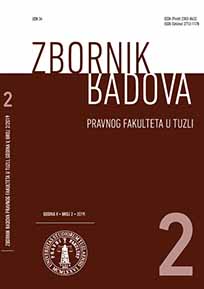CARINSKO PRAVO SREDNJOVJEKOVNE BOSNE
CUSTOMS LAW OF MEDIEVAL BOSNIA
Author(s): Dževad DrinoSubject(s): Law, Constitution, Jurisprudence, History of Law, Economic history, Middle Ages, Commercial Law
Published by: Pravni fakultet Univerziteta u Tuzli
Keywords: Bosnia; customs; Dubrovnik; tax, trade;
Summary/Abstract: Customs duties are a form of indirect tax that is paid when goods cross the state border; in the Middle Ages, they were collected differently than they are today, derived from the custom of the establishedrevenue of the Crown where their name comes from. Customs are collected by the ruler, the state, but also by individual cities; in Egypt it is considered to have been established during the era of Pharaoh Djoser (period of the Old Empire, 2670-2150 BC), in ancient Athensit amounted to 2% for import and export through the port of Piraeus,while the Roman Empire preserved the text of the customs the law of the Province of Asia (Lex portorii Asiae) by which it was 2-2.5%and was paid at the borders of the province.Kulin Ban Charter of 1189.g. does not mention the word customs,it first appears in the charters of Ban Matej Ninoslav (1232-1249),which freely exempts merchants from Dubrovnik from paying all customs duties. Ban Stjepan II Kotromanić (1292-1353), who doubled state territory and left for the Adriatic, in February 1326. informsthe people of Dubrovnik about the introduction of a 10% duty, by a charter of 1332. The 100-year pause in the issuance of the Dubrovnik charter was interrupted, and by the charter of 1334. lease of customs established.
Journal: Zbornik radova Pravnog fakulteta u Tuzli
- Issue Year: 5/2019
- Issue No: 2
- Page Range: 79-91
- Page Count: 13
- Language: Bosnian

